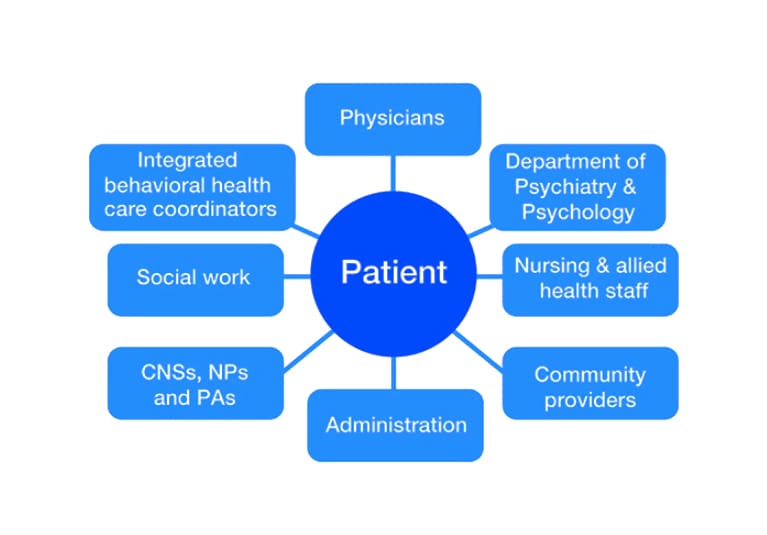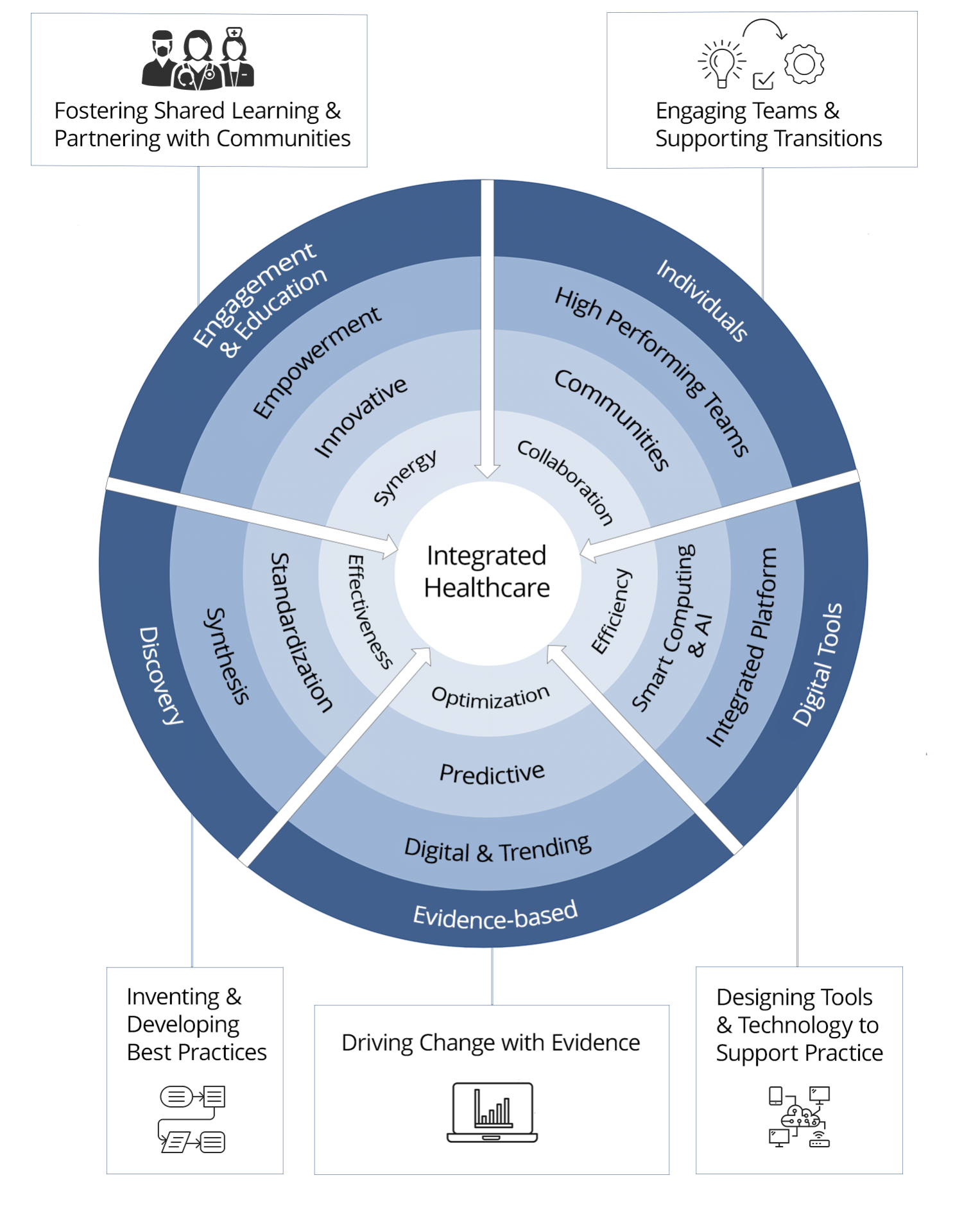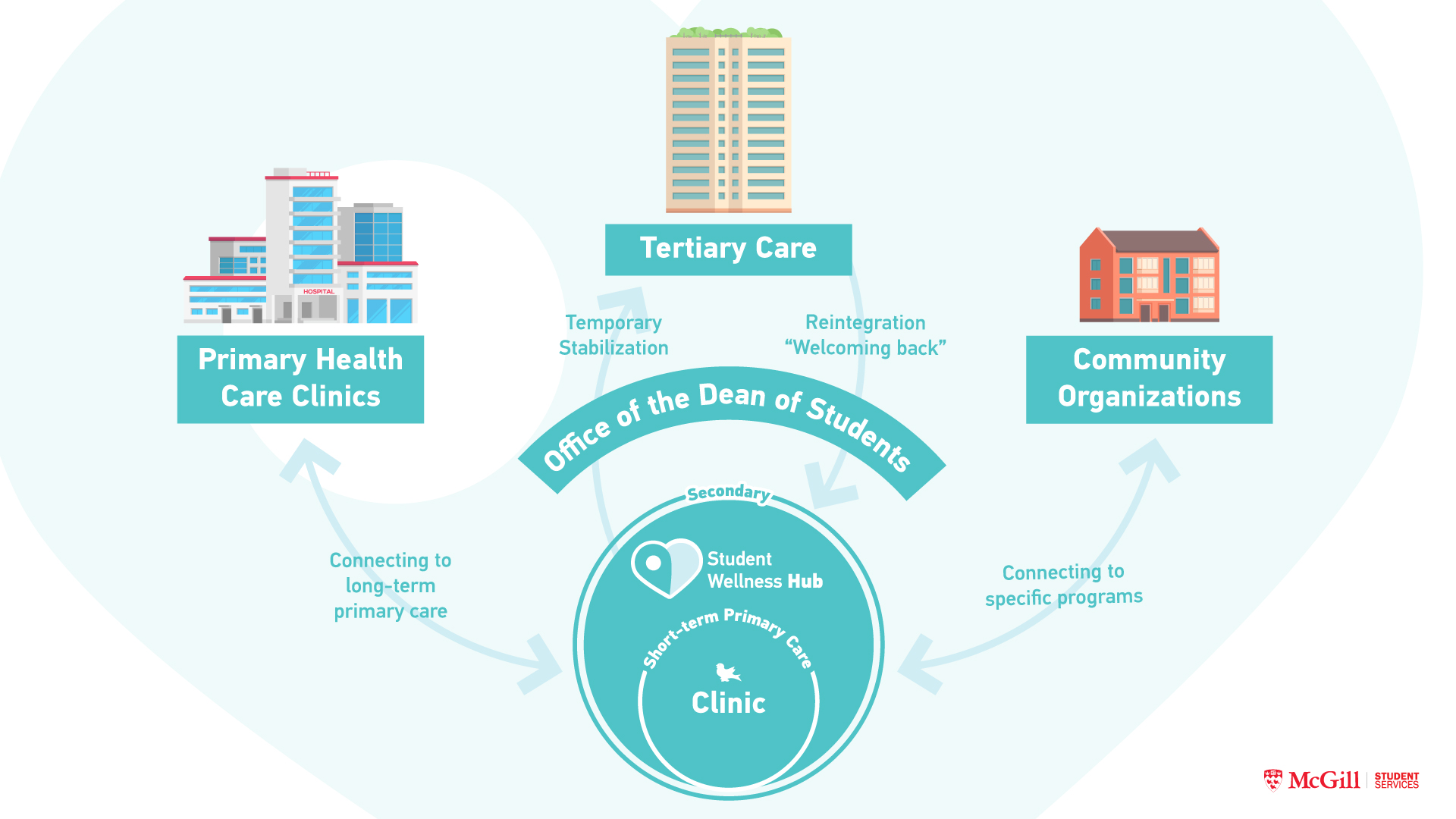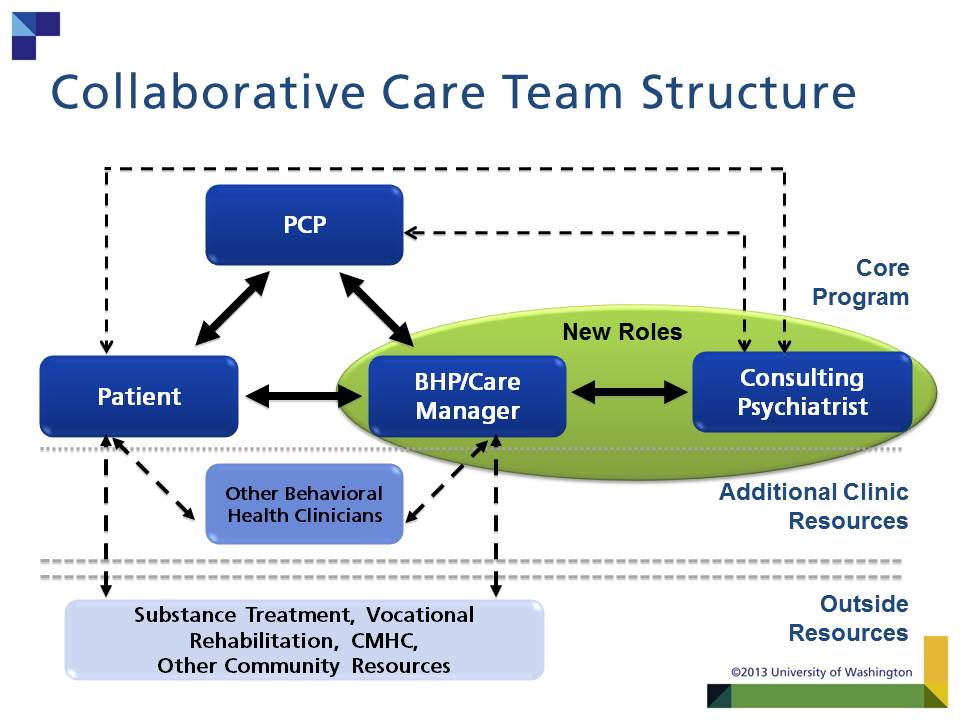Your Collaborative care model images are ready. Collaborative care model are a topic that is being searched for and liked by netizens now. You can Get the Collaborative care model files here. Download all royalty-free photos.
If you’re searching for collaborative care model pictures information linked to the collaborative care model interest, you have come to the ideal blog. Our site frequently gives you suggestions for viewing the highest quality video and image content, please kindly hunt and find more informative video content and images that fit your interests.
Collaborative Care Model. Accountable care providers are accountable and reimbursed for quality of care and clinical outcomes, not just the volume of care provided. Unfortunately, less than one in twenty americans can currently access it. The collaborative care model (cocm) the collaborative care model (cocm ) presentation title, version # topic objectives introductions the why cocm model overview • review thebasics of the cocm model including the evidence behind the model as it relates to the prevalence of mental health needs the process of cocm Affiliation 1 a department of psychological medicine.
 Learn About the Collaborative Care Model From psychiatry.org
About how we can deliver high qu ality, safe, patient care. Reimbursement for the collaborative care model. 4 as bajorin and hanley have pointed out, we need to educate oncology professionals at all levels regarding the potential benefits of collaborative practice for our patients and for our practices. The collaborative care model (cocm) the collaborative care model (cocm ) presentation title, version # topic objectives introductions the why cocm model overview • review thebasics of the cocm model including the evidence behind the model as it relates to the prevalence of mental health needs the process of cocm This is a model that will help us manage the global health Collaborative care itself has a substantial evidence base for its effectiveness, one of the few integrated care models that does.
The 2003 institute of medicine report recommends that all health professionals be educated to deliver care in collaborative models.
The collaborative care model is characterized by an integrated team of mental health professionals and other medical professionals who communicate systematically and share treatment goals. Collaborative care’s goal is to treat the large numbers of people suffering unnecessarily from mental illness by providing a model of care that integrates mental and physical health care in familiar settings. Collaborative care or collaborative care model? It aims to improve the physical and mental health of people with mental illness. Read more about accountability in our financing section. About how we can deliver high qu ality, safe, patient care.
 Source: researchgate.net
Source: researchgate.net
In essence, it means bringing together. The collaborative care model is characterized by an integrated team of mental health professionals and other medical professionals who communicate systematically and share treatment goals. The collaborative care model (cocm) the collaborative care model (cocm ) presentation title, version # topic objectives introductions the why cocm model overview • review thebasics of the cocm model including the evidence behind the model as it relates to the prevalence of mental health needs the process of cocm It aims to improve the physical and mental health of people with mental illness. Collaborative care’s goal is to treat the large numbers of people suffering unnecessarily from mental illness by providing a model of care that integrates mental and physical health care in familiar settings.
 Source: researchgate.net
Source: researchgate.net
This is a model that will help us manage the global health The collaborative care model is characterized by an integrated team of mental health professionals and other medical professionals who communicate systematically and share treatment goals. An example of our collaborative care model is the “screening, brief interventions, and referral to treatment” approach: The collaborative care model requires care providers to use a registry that tracks clinical outcomes of members and supports integrated care of that member’ s treatment. About how we can deliver high qu ality, safe, patient care.
 Source: psychiatry.org
The collaborative care model (cocm) the collaborative care model (cocm ) presentation title, version # topic objectives introductions the why cocm model overview • review thebasics of the cocm model including the evidence behind the model as it relates to the prevalence of mental health needs the process of cocm Integrated care, primary care behavioral health, integrated care systems, and shared care. The collaborative care model (cocm) the collaborative care model (cocm ) presentation title, version # topic objectives introductions the why cocm model overview • review thebasics of the cocm model including the evidence behind the model as it relates to the prevalence of mental health needs the process of cocm The new maudsley model eat disord. Primary care practices that are providing collaborative care services can now bill for those services using cpt® codes for psychiatric collaborative care management services (99492, 99493, 99494).
 Source: psychiatryadvisor.com
Source: psychiatryadvisor.com
The collaborative care model requires care providers to use a registry that tracks clinical outcomes of members and supports integrated care of that member’ s treatment. Unfortunately, less than one in twenty americans can currently access it. Accountable care providers are accountable and reimbursed for quality of care and clinical outcomes, not just the volume of care provided. The collaborative practice model of care is one solution that can help us work toward a system that provides better quality, better value, and supports better patient and health outcomes. Collaborative care is a healthcare philosophy and movement that has many names, models, and definitions that often includes the provision of mental health, behavioral health and substance use services in primary care.
 Source: researchgate.net
Source: researchgate.net
Integrated care, primary care behavioral health, integrated care systems, and shared care. The collaborative care model is characterized by an integrated team of mental health professionals and other medical professionals who communicate systematically and share treatment goals. Collaborative care is a healthcare philosophy and movement that has many names, models, and definitions that often includes the provision of mental health, behavioral health and substance use services in primary care. Integrated care, primary care behavioral health, integrated care systems, and shared care. The new maudsley model eat disord.
 Source: mayoclinic.org
Source: mayoclinic.org
The 2003 institute of medicine report recommends that all health professionals be educated to deliver care in collaborative models. 4 as bajorin and hanley have pointed out, we need to educate oncology professionals at all levels regarding the potential benefits of collaborative practice for our patients and for our practices. Collaborative care is an effective model for integrating behavioural (mental) health care into primary care medical settings. (1) care coordination and care management; The collaborative practice model of care is one solution that can help us work toward a system that provides better quality, better value, and supports better patient and health outcomes.
 Source: practicalpainmanagement.com
Psychologists often collaborate with physicians and other health care providers to improve a mutual patient’s care. Collaborative care’s goal is to treat the large numbers of people suffering unnecessarily from mental illness by providing a model of care that integrates mental and physical health care in familiar settings. It aims to improve the physical and mental health of people with mental illness. Primary care practices that are providing collaborative care services can now bill for those services using cpt® codes for psychiatric collaborative care management services (99492, 99493, 99494). In our practice, a multidisciplinary “teamlet” of a behavioral health coach, a social worker, and a psychiatrist work together in a coordinated fashion to provide treatment to the patient, and to.
 Source: sunnybrook.ca
Source: sunnybrook.ca
Accountable care providers are accountable and reimbursed for quality of care and clinical outcomes, not just the volume of care provided. Psychologists often collaborate with physicians and other health care providers to improve a mutual patient’s care. It aims to improve the physical and mental health of people with mental illness. The collaborative care model is characterized by an integrated team of mental health professionals and other medical professionals who communicate systematically and share treatment goals. 4 as bajorin and hanley have pointed out, we need to educate oncology professionals at all levels regarding the potential benefits of collaborative practice for our patients and for our practices.
 Source: semanticscholar.org
Source: semanticscholar.org
The collaborative care model is a systematic approach to the treatment of depression and anxiety in primary care settings that involves the integration of care managers and consultant psychiatrists, with primary care physician oversight, to more proactively manage mental disorders as chronic diseases, rather than treating acute symptoms. Collaborative care itself has a substantial evidence base for its effectiveness, one of the few integrated care models that does. The collaborative care model (cocm) the collaborative care model (cocm ) presentation title, version # topic objectives introductions the why cocm model overview • review thebasics of the cocm model including the evidence behind the model as it relates to the prevalence of mental health needs the process of cocm The collaborative practice model of care is one solution that can help us work toward a system that provides better quality, better value, and supports better patient and health outcomes. The 2003 institute of medicine report recommends that all health professionals be educated to deliver care in collaborative models.
 Source: mcgill.ca
Source: mcgill.ca
The collaborative practice model of care is one solution that can help us work toward a system that provides better quality, better value, and supports better patient and health outcomes. The collaborative care model is a systematic approach to the treatment of depression and anxiety in primary care settings that involves the integration of care managers and consultant psychiatrists, with primary care physician oversight, to more proactively manage mental disorders as chronic diseases, rather than treating acute symptoms. Collaborative care’s goal is to treat the large numbers of people suffering unnecessarily from mental illness by providing a model of care that integrates mental and physical health care in familiar settings. The collaborative care model (cocm) is a proven tool to detect and prevent suicide and overdose in primary care before they become crises. Psychologists often collaborate with physicians and other health care providers to improve a mutual patient’s care.
 Source: researchgate.net
Source: researchgate.net
In essence, it means bringing together. Primary care practices that are providing collaborative care services can now bill for those services using cpt® codes for psychiatric collaborative care management services (99492, 99493, 99494). About how we can deliver high qu ality, safe, patient care. Read more about accountability in our financing section. Collaborative care is an effective model for integrating behavioural (mental) health care into primary care medical settings.
 Source: reachout4teens.org
Source: reachout4teens.org
Collaborative care or collaborative care model? The collaborative practice model of care is one solution that can help us work toward a system that provides better quality, better value, and supports better patient and health outcomes. Integrated care, primary care behavioral health, integrated care systems, and shared care. Read more about accountability in our financing section. Collaborative care itself has a substantial evidence base for its effectiveness, one of the few integrated care models that does.
 Source: cbsindy.org
Source: cbsindy.org
It aims to improve the physical and mental health of people with mental illness. Collaborative care is a healthcare philosophy and movement that has many names, models, and definitions that often includes the provision of mental health, behavioral health and substance use services in primary care. Integrated care, primary care behavioral health, integrated care systems, and shared care. Collaborative care’s goal is to treat the large numbers of people suffering unnecessarily from mental illness by providing a model of care that integrates mental and physical health care in familiar settings. The primary care provider, behavioral health care manager, and psychiatric consultant function as a team, using a shared care plan, to meet the needs of patients with mild to moderate behavioral health concerns.
.png “When Addiction and Mental Illness Collide NIH HEAL”) Source: heal.nih.gov
An example of our collaborative care model is the “screening, brief interventions, and referral to treatment” approach: The collaborative care model (cocm) the collaborative care model (cocm ) presentation title, version # topic objectives introductions the why cocm model overview • review thebasics of the cocm model including the evidence behind the model as it relates to the prevalence of mental health needs the process of cocm Affiliation 1 a department of psychological medicine. The collaborative care model (cocm) is a proven tool to detect and prevent suicide and overdose in primary care before they become crises. Primary care practices that are providing collaborative care services can now bill for those services using cpt® codes for psychiatric collaborative care management services (99492, 99493, 99494).
 Source: aims.uw.edu
The collaborative care model requires care providers to use a registry that tracks clinical outcomes of members and supports integrated care of that member’ s treatment. The collaborative care model is a systematic approach to the treatment of depression and anxiety in primary care settings that involves the integration of care managers and consultant psychiatrists, with primary care physician oversight, to more proactively manage mental disorders as chronic diseases, rather than treating acute symptoms. Collaborative care is an effective model for integrating behavioural (mental) health care into primary care medical settings. In essence, it means bringing together. (1) care coordination and care management;
 Source: mhinnovation.net
Source: mhinnovation.net
The collaborative care model is a systematic approach to the treatment of depression and anxiety in primary care settings that involves the integration of care managers and consultant psychiatrists, with primary care physician oversight, to more proactively manage mental disorders as chronic diseases, rather than treating acute symptoms. Primary care practices that are providing collaborative care services can now bill for those services using cpt® codes for psychiatric collaborative care management services (99492, 99493, 99494). About how we can deliver high qu ality, safe, patient care. Psychologists often collaborate with physicians and other health care providers to improve a mutual patient’s care. In essence, it means bringing together.
 Source: aims.uw.edu
Source: aims.uw.edu
Collaborative care is a healthcare philosophy and movement that has many names, models, and definitions that often includes the provision of mental health, behavioral health and substance use services in primary care. Psychologists often collaborate with physicians and other health care providers to improve a mutual patient’s care. Integrated care, primary care behavioral health, integrated care systems, and shared care. 4 as bajorin and hanley have pointed out, we need to educate oncology professionals at all levels regarding the potential benefits of collaborative practice for our patients and for our practices. The collaborative care model (cocm) the collaborative care model (cocm ) presentation title, version # topic objectives introductions the why cocm model overview • review thebasics of the cocm model including the evidence behind the model as it relates to the prevalence of mental health needs the process of cocm
 Source: lichlyterconsulting.com
Source: lichlyterconsulting.com
The collaborative care model requires care providers to use a registry that tracks clinical outcomes of members and supports integrated care of that member’ s treatment. The collaborative care model is characterized by an integrated team of mental health professionals and other medical professionals who communicate systematically and share treatment goals. About how we can deliver high qu ality, safe, patient care. In essence, it means bringing together. Psychologists often collaborate with physicians and other health care providers to improve a mutual patient’s care.
This site is an open community for users to do sharing their favorite wallpapers on the internet, all images or pictures in this website are for personal wallpaper use only, it is stricly prohibited to use this wallpaper for commercial purposes, if you are the author and find this image is shared without your permission, please kindly raise a DMCA report to Us.
If you find this site serviceableness, please support us by sharing this posts to your own social media accounts like Facebook, Instagram and so on or you can also bookmark this blog page with the title collaborative care model by using Ctrl + D for devices a laptop with a Windows operating system or Command + D for laptops with an Apple operating system. If you use a smartphone, you can also use the drawer menu of the browser you are using. Whether it’s a Windows, Mac, iOS or Android operating system, you will still be able to bookmark this website.






